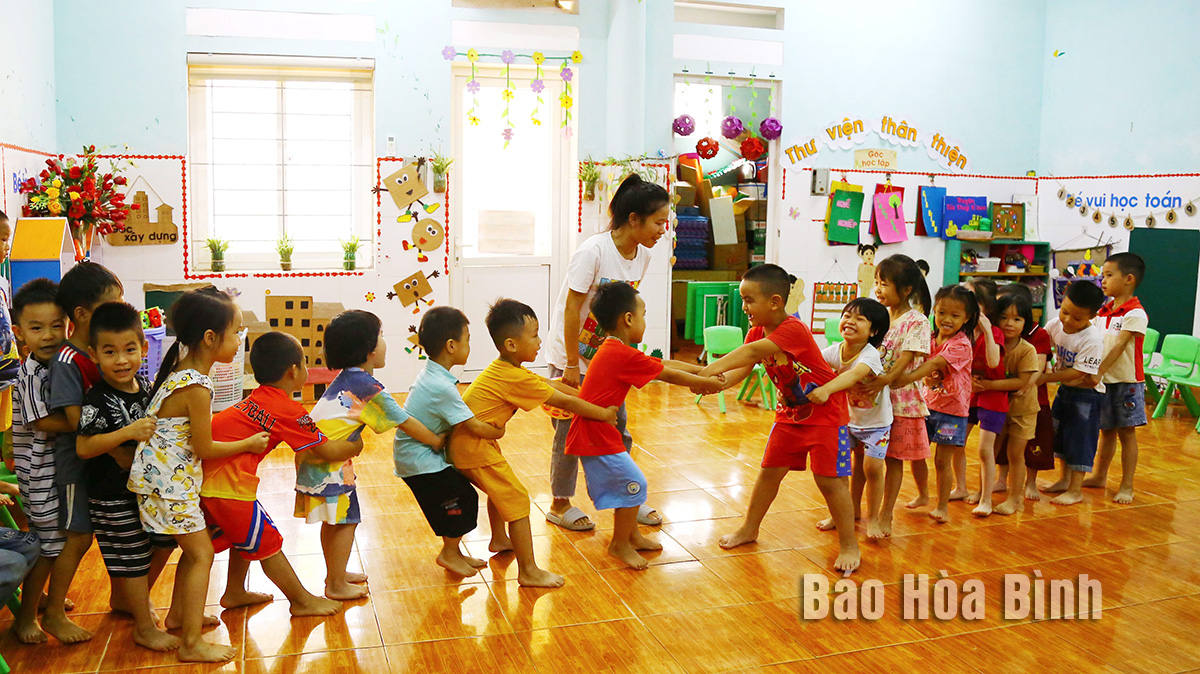
(HBO) - The Vietnamese Party and State always consider education and training as a top national policy, and investing in education as investing in development. Thoroughly grasping the stances, guidelines and policies of the Party and State, over the past years, Hoa Binh province has taken concerted measures on education and training development, with attention paid to well implementing the 11th Party Central Committee’s Resolution No. 29-NQ/TW, dated November 4, 2013, on fundamental and comprehensive innovation in education and training to meet the requirements of industrialisation and modernisation in the context of a socialist-oriented market economy and international integration.

Kindergarten in
Hoa Binh commune, Hoa Binh city, creates a cultural environment for children to
develop comprehensively.
The quality of education universalisation and mass education
is improved year after year. Many active teaching methods and teaching models
in accordance with the 2018 general education programme are implemented,
gradually shifting the educational process from mainly equipping knowledge to
comprehensively developing learners' abilities and qualities.
At a recent conference to summarise the 10 years
implementing Resolution 29-NQ/TW organised by the province, Nguyen Phi Long,
alternate member of the Party Central Committee, Secretary of the provincial
Party Committee, ordered the good implementation of mechanisms and policies for
education and training development.
He stressed the need to pay attention to improving the
quality of teachers and educational administrators by fostering their political
and ethical qualities, and developing their teaching capacity in accordance
with requirements of education and training innovation, building plans to
develop non-public preschools and high schools and those meeting national
standards for the 2023-2030 period, and implementing mechanisms and policies to
attract contributions and sponsorship from individuals, organisations, and
businesses at home and abroad to improve the quality of education.
It is also necessary to ensure equal treatment and create a
fair and transparent competitive environment so that learners at non-public
educational institutions can access educational opportunities and benefit from
the Party and State's educational development policies, innovate methods and
diversify forms of teaching in the direction of developing students' qualities
and abilities, and reform the management of teaching activities, he added.
In late March, 29 labourers from Da Bac district were sent to work as seasonal farm workers in Buyeo county, Chungcheongnam province, the Republic of Korea (RoK). Upon arrival, they quickly settled into their jobs, enjoying good working conditions and benefits, with wages aligned with the terms of their signed contracts. The programme is now being expanded, with relevant departments and sectors actively seeking additional seasonal employment opportunities in various localities across the RoK.
Luong Son Industrial Park has invested in standardised wastewater and emissions treatment systems, enforced tight emission controls, reduced noise, dust, and solid waste, and expanded green spaces, contributing to protecting the environment and promoting sustainable development.
Hoa Binh police are collecting public feedback on amendments to the 2013 Constitution via the national identification app VNeID. This innovative approach marks a giant leap towards modernising grassroots democracy and enhancing transparency in public consultation.
A total public investment capital of 113 billion VND (over 4.3 million USD) was disbursed for a project to upgrade infrastructure and stabilise residents in the vicinity of the Da River reservoir between 2021 and the first quarter of 2025, giving a facelift to local rural areas and improving the quality of people's life.
Since the end of 2023-2024 academic year, Cu Yen Primary and Secondary School in Luong Son district has deployed e-study records for all of its 500 primary students, said the school principal Nguyen Thi Tuyen.
The Labour Federation of Hoa Binh city has actively worked to protect the rights and welfare of nearly 8,000 local workers and union members at 152 grassroots unions. Through regular dialogues, education campaigns, and welfare programmes, the federation has helped foster stable, progressive labour relations.



